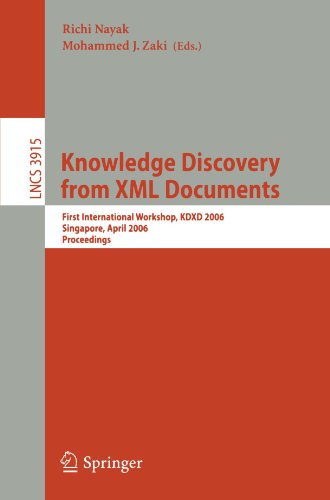

Most ebook files are in PDF format, so you can easily read them using various software such as Foxit Reader or directly on the Google Chrome browser.
Some ebook files are released by publishers in other formats such as .awz, .mobi, .epub, .fb2, etc. You may need to install specific software to read these formats on mobile/PC, such as Calibre.
Please read the tutorial at this link: https://ebookbell.com/faq
We offer FREE conversion to the popular formats you request; however, this may take some time. Therefore, right after payment, please email us, and we will try to provide the service as quickly as possible.
For some exceptional file formats or broken links (if any), please refrain from opening any disputes. Instead, email us first, and we will try to assist within a maximum of 6 hours.
EbookBell Team

4.0
86 reviewsThe KDXD 2006 (Knowledge Discovery from XML Documents) workshop is the ?rst international workshop running this year in conjunction with the 10th Paci?c-Asia Conference on Knowledge Discovery and Data Mining, PAKDD 2006. The workshop provided an important forum for the dissemination and exchange of new ideas and research related to XML data discovery and retrieval. The eXtensible Markup Language (XML) has become a standard language for data representation and exchange. With the continuous growth in XML data sources,theabilitytomanagecollectionsofXMLdocumentsanddiscoverkno- edge from them for decision support becomes increasingly important. Due to the inherent ?exibility ofXML, in both structure and semantics, inferring important knowledge from XML data is faced with new challenges as well as bene?ts. The objective of the workshop was to bring together researchers and practitioners to discuss all aspects of the emerging XML data management challenges. Thus, the topics of interest included, but were not limited to: XML data mining methods; XML data mining applications; XML data management emerging issues and challenges; XML in improving knowledge discovery process; and Benchmarks and mining performance using XML databases. The workshop received 26 submissions. We would like to thank all those who submittedtheirworktotheworkshopunderrelativelypressuringtimedeadlines. We selected ten high-quality full papers for discussion and presentation in the workshop and for inclusion in the proceedings after being peer-reviewed by at least three members of the Program Committee. Accepted papers were grouped in three sessions and allocated equal presentation time slots. The ?rst session was on XML data mining methods of classi?cation, clustering and association.